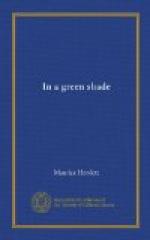Some time or another, Apollo my helper, I would choose to write a new Works and Days wherein the land-lore of our own Boeotia should be recorded and enshrined for a season. There should be less practice than Tusser gives you, less art than the Georgics, but rather more of each than Hesiod finds occasion for. Though it is long since I read the Georgics, I seem to remember that the poem was overloaded with spicy merchandise. You might die of it in aromatic pain. As for Tusser, certainly he is the complete Elizabethan farmer; sooner than leave anything out he will say it twice; sooner than say it twice, he will say it three times. Nevertheless he was a good farmer; as poet, his itch to be quaint and anxiety to find a rhyme combine to make him difficult. He writes like Old Moore:
Strong yoke for a hog, with a twitcher
and rings,
With tar in a tarpot, for dangerous things;
A sheep-mark, a tar-kettle, little or
mitch,
Two pottles of tar to a pottle of pitch.
“Mitch” is a desperate rhyme, but nothing to Tusser. He gives you a league or more of that; all the same, I don’t doubt he was a better farmer than Virgil. More of him anon.
Hesiod also was a better farmer than Virgil, and a poet into the bargain, though the Mantuan had him there. He prefers terseness to eloquence, is on the dry side, and avoids ornament as if he was a Quaker. Such adjectives as he allows himself are Homer’s, well-worn and familiar. The sea is atrugetos, Zeus hypsibremetes, the earth polyboteire, the hawk tanysipteros, and so on. They have no more effect upon you than the egg-and-dart mouldings on your cornices. His own tropes are more curious than beautiful, but I cannot deny their charm. The spring, with him, is always gray—[Greek: polion ear]—which is exact for the moment when the breaking leaf-buds are no more than a mist over the woodlands. You shall begin your harvesting—
When the House-carrier shuns the Pleiades,
And climbs the stalks to get a little
ease.
The House-carrier is the snail, of course; and he shuns the heat of the ground, not the Pleiades. Here again is a maxim deeply involved in language:
When ’tis a god’s high feast
let not your knife
Cut off the withered from the quick with
life,
Upon the five-brancht stock—
or, in other words, never cut your finger-nails on a holy day.
Hesiod, by birth an AEolian, was by settlement a Boeotian. He lived and farmed his own land on the slopes of Helikon, under the governance of the lords of Thespiae, whoever they were. I have been to Thespiae, and certify that there are no lords there now. I saw little but fleas and dogs of incredible savagery, where once were the precinct and shrine of Eros with a famous statue of the god by Praxiteles. It is not far from the Valley of the Muses, where or whereabouts those fair ladies met with Hesiod, and, as we are told in the Theogony, plucked him a rod of olive, a thing of wonder,




